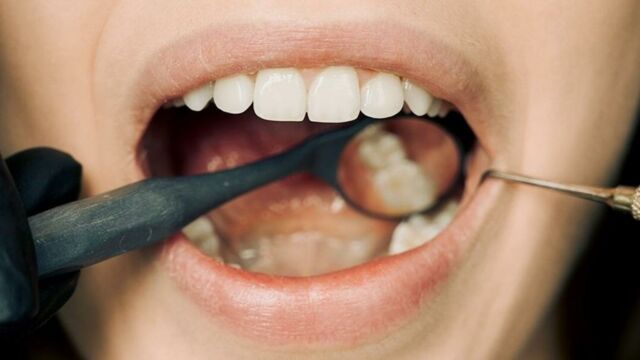This is what the colour of your teeth says about your oral health

The colour of your teeth can reveal a lot about your lifestyle, habits and overall oral health.
Dental hygiene is extremely important for our overall health. In fact according to dentists, your teeth say a lot about you, including early symptoms of diseases hiding in your mouth, and even indicate your risk of developing devastating memory disorder.
Discover our latest podcast
Apart from keeping in mind the correct ways of brushing your teeth, you should also pay attention to the colour of your teeth. As per Cleveland Clinic, there's lots about your general health and lifestyle that the colour of your teeth reveals. Again, if you have discolouration of teeth, the precise colour can indicate what is wrong with it.
More under this adMore under this adHere's what experts have to say about it.
What is the ideal colour for your teeth?
As per Noble Dental Care, even though 'pearly whites' are celebrated as the ideal colour for teeth, you should not worry if your teeth are not fully white and sparkly. In fact, a shade of colour anywhere from white to light yellow indicates healthy teeth, and is normal for most adults.
Tooth enamel is slightly translucent, allowing the dentin (the layer underneath your enamel) to show through. As per Cleveland Clinic, there are both extrinsic and intrinsic factors that can affect the colour of your teeth.
More under this adMore under this ad
The extrinsic factors relate to the external surface of your teeth, while the intrinsic factors relate to problems inside. Intrinsic factors can also include ageing, which can affect the dentin, causing it to darken.
More under this adMore under this adYour teeth does not turn another colour out the blue, and in general, the process is a gradual one.
Causes of tooth discolouration
As per the report, tooth discolouration happens due to both avoidable and unavoidable reasons. Some of the avoidable reasons include poor oral hygiene, consumption of too much teeth-staining foods such as coffee, wine, berries, and habits such as smoking or tobacco consumption or even excessive fluoride consumption.
The non-avoidable reasons for the colour of your teeth includes factors such as ageing, dental treatments and genetics. Certain medications such as for blood pressure or some antihistamines can also affect the colour of your teeth.
More under this adMore under this adTreatments such as chemotherapy could also cause teeth discolouration. Apart from this, factors such as liver disease or calcium deficiency can also affect dental health causing your teeth to change colour.
What different teeth colour means
The colour of your teeth can indicate the reasons for their discolouration. Here is what Cleveland Clinic has to say about what different colour of your teeth means for oral health,
More under this adMore under this ad- Yellow stains are generally not harmful, and are the result of staining caused by food and drinks. An improvement in your oral hygiene regime, as well as paying attention to what you consume should be enough to tackle it.
- Brown discolouration happens due to smoking or chewing tobacco. If this comes with stains as well as small holes or pitting on your teeth, its a sign of tooth decay and should be addressed with a dentist.
- Purple teeth usually is the sign of staining from tannins. This is found in people who drink a lot of red wine.
- If you find a grey tooth, it indicates dental trauma, which can cause the nerve inside your tooth to die.
- If you spot white flecks on your teeth, it may be an indication of dental fluorosis, which is caused when you consume high levels of fluoride during childhood when your teeth were developing.
- Black spots on your teeth typically indicate severe decay.
Read more:
⋙ Worried about your wisdom teeth, this is when you should consider having them removed
⋙ These everyday foods and drinks can stain your teeth
⋙ These popular teeth 'hacks' could cause you permanent damage
Sources used:
Cleveland Clinic: 'Tooth Discoloration'
Noble Dental Care: ' What Does Your Tooth Color Mean?'